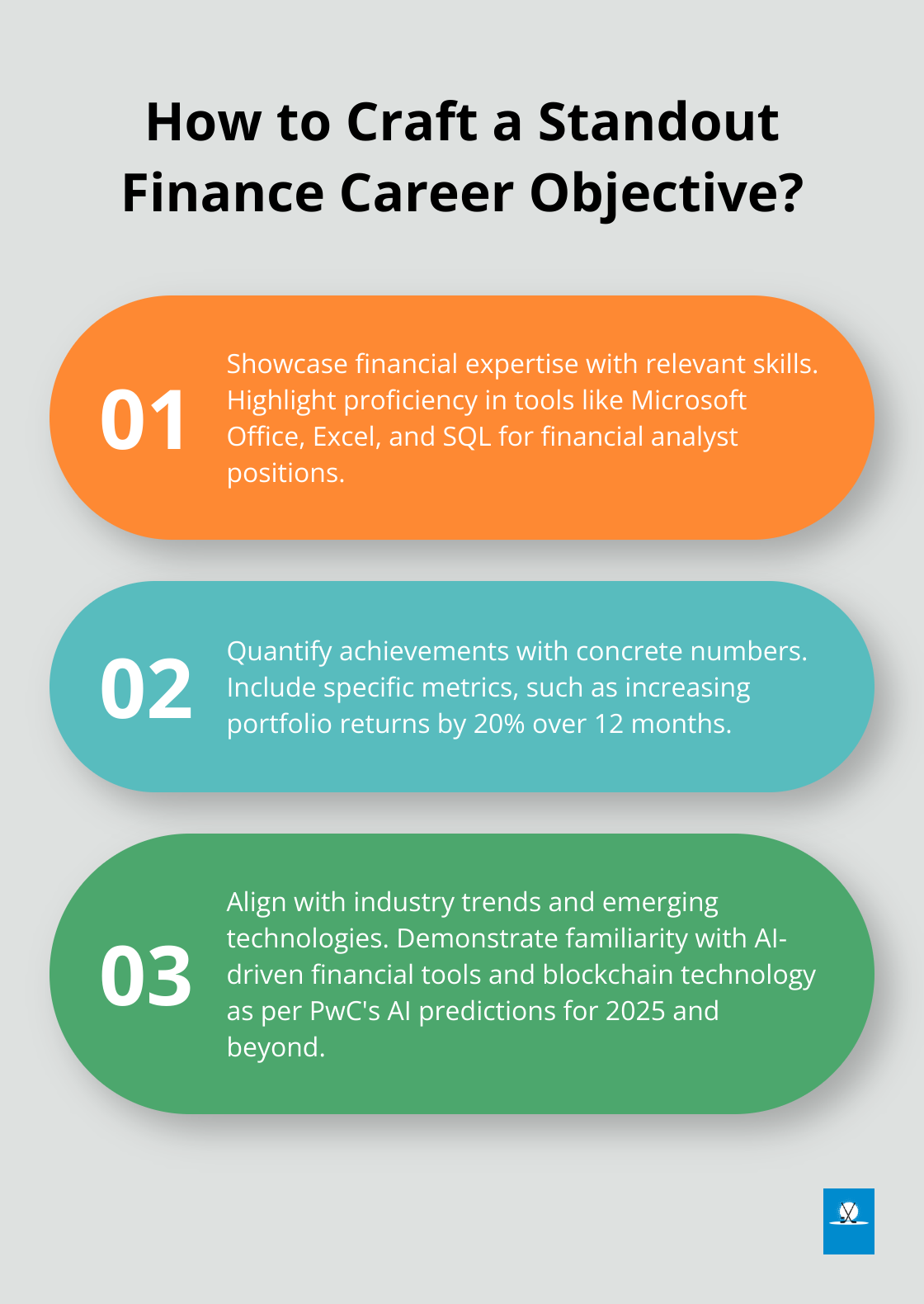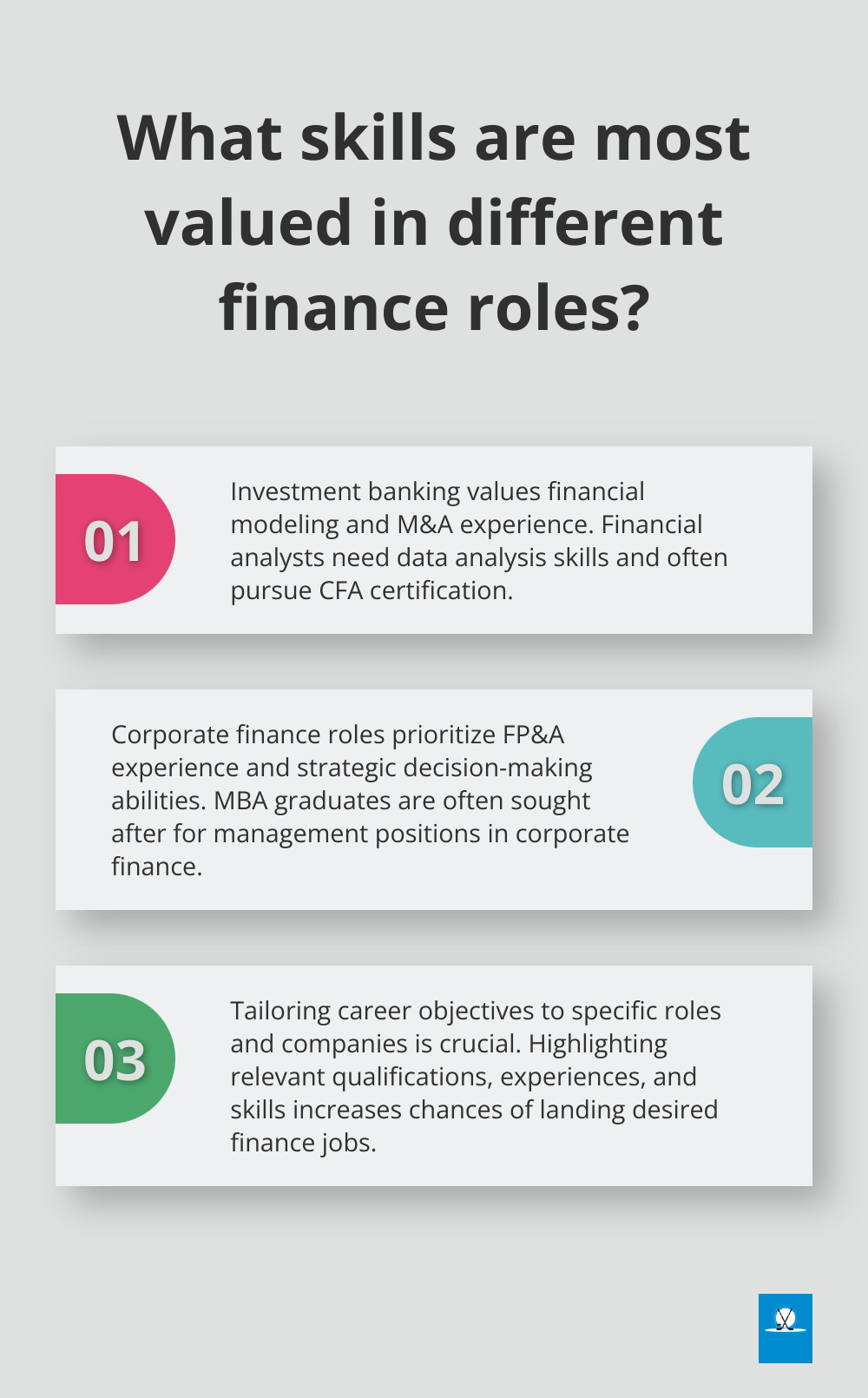At Pro Hockey Advisors, we understand the importance of a strong career objective in finance. This crucial element can set you apart in a competitive job market.
A well-crafted career objective for finance positions showcases your skills, experience, and aspirations. It’s your chance to make a powerful first impression on potential employers.
What Is a Career Objective in Finance?
Definition and Purpose
A career objective in finance is a concise statement that outlines your professional goals, skills, and value proposition to potential employers. It sits at the top of your resume and provides a snapshot of your career aspirations and qualifications.
The Impact of a Strong Career Objective
In the competitive finance industry, a well-crafted career objective can make a significant difference. A survey by Jobvite revealed that 56% of workers view a good resume as more important now than three months ago. This statistic underscores the importance of customizing your objective for each application.
Key Components of an Effective Career Objective
An impactful career objective in finance should include:
- Your specific financial expertise (e.g., financial analysis, risk management)
- Relevant qualifications or certifications (e.g., CFA, MBA)
- Career goals aligned with the position and company

For example: “Experienced financial analyst with a CFA certification seeks to leverage data-driven insights to optimize investment strategies at XYZ Investment Firm.”
Career Objective vs. Personal Statement
While both are brief introductory statements, a career objective focuses on your professional goals and what you can offer an employer. A personal statement provides a broader overview of your background, motivations, and personal qualities.
In finance, where precision and clarity are valued, a career objective is often preferred. It allows you to quickly communicate your professional intent and relevant skills, helping recruiters assess your fit for specific roles more efficiently.
Tailoring Your Objective
To create a compelling career objective, try to:
- Research the company and position thoroughly
- Use industry-specific keywords (found in the job description)
- Quantify your achievements when possible (e.g., “increased portfolio returns by 15%”)
A well-crafted career objective sets the tone for your entire resume. It’s your first opportunity to grab the attention of potential employers and showcase your value. In the next section, we’ll explore how to tailor your career objective for different finance roles, ensuring you stand out in this competitive field.
What Makes a Finance Career Objective Stand Out?
Showcase Your Financial Expertise
A compelling career objective for finance positions highlights your most relevant financial skills. If you apply for a financial analyst position, emphasize your proficiency in Microsoft Office and financial modeling tools. Your clear statement of expertise addresses a critical need in the industry.

Example: “Financial analyst with advanced Excel and SQL skills seeks to apply data-driven insights to optimize investment strategies.”
Quantify Your Achievements
Numbers speak volumes in finance. Include quantifiable achievements from your past experiences whenever possible. This approach provides concrete evidence of your capabilities and potential value to prospective employers.
Example: “Increased portfolio returns by 20% over 12 months through strategic asset allocation and risk management techniques.”
Align with Industry Trends
The finance industry evolves constantly. Show that you stay up-to-date with the latest trends and technologies. PwC’s AI predictions provide actionable strategies and industry insights shaping AI’s role in business transformation for 2025 and beyond. Mention your familiarity with AI-driven financial tools or blockchain technology to set yourself apart.
Example: “Seek to apply machine learning algorithms to enhance predictive financial models and drive data-informed decision-making.”
Tailor to the Position
Customize your career objective for each application. Research the company and position thoroughly, and use industry-specific keywords found in the job description. This tailored approach shows your genuine interest and understanding of the role.
Example: “Experienced risk analyst (with a focus on market risk) aims to contribute to XYZ Bank’s risk management strategies and enhance overall financial stability.”
Keep It Concise and Impactful
Your career objective should pack a punch in a short space. Try to limit it to 2-3 sentences, but ensure it contains information that makes hiring managers want to learn more about you. Focus on your unique skills, quantifiable achievements, and alignment with industry trends to create a career objective that truly stands out in the competitive finance job market.
As we move forward, we’ll explore how to tailor your career objective for specific finance roles, ensuring you make a lasting impression in various sectors of the industry.
Tailoring Your Career Objective for Finance Roles
Investment Banking Career Objectives
Investment banking requires a unique set of skills and a strong drive for success. Your career objective should reflect your ambition, analytical skills, and ability to work under pressure. For example:
“I seek an investment banking analyst position to apply my financial modeling expertise and M&A experience to drive value for clients at a top-tier investment bank.”

This objective highlights specific skills (financial modeling) and experience (M&A) that are essential in investment banking. It also demonstrates ambition by mentioning “top-tier investment bank.”
Financial Analyst Career Objectives
Financial analysts need to showcase their analytical skills, attention to detail, and ability to provide insights that drive business decisions. A strong career objective for this role might be:
“As a CFA Level II candidate with experience in equity research, I aim to apply advanced data analysis skills to improve investment strategies as a financial analyst at XYZ Asset Management.”
This objective emphasizes relevant qualifications (CFA), specific experience (equity research), and key skills (data analysis). It also targets a particular company, showing focused career goals.
Corporate Finance Career Objectives
In corporate finance, employers value candidates who can contribute to the company’s financial health and strategic planning. An effective career objective could be:
“As an MBA graduate with experience in FP&A, I want to optimize financial processes and support strategic decision-making as a Finance Manager in a fast-growing tech company.”
This objective highlights educational background (MBA), relevant experience (FP&A), and specific goals (optimizing processes, supporting decisions). It also indicates a preference for a particular industry (tech), showing career focus.
Customizing Your Objective
The key is to tailor your objective to each specific role and company. Research the company thoroughly, understand their needs, and align your objective with their goals and values. A well-crafted, targeted career objective can significantly improve your chances of landing that dream finance job.
Avoiding Common Pitfalls
When writing your career objective, avoid generic statements that could apply to any finance role. Instead, focus on specific skills and experiences that set you apart. Try to use action verbs and quantifiable achievements (e.g., “increased portfolio returns by 15%”) to make your objective more impactful.
Planning for the Future
As you craft your career objective, it’s important to consider your long-term career goals. Even in finance, careers can take unexpected turns, and it’s wise to manage finances and plan for various scenarios, including potential career transitions or early retirement.
Final Thoughts
A compelling career objective in finance serves as your professional calling card. It instantly communicates your value to potential employers and demonstrates your understanding of the industry. You should tailor your career objective to specific roles and companies, focusing on your unique skills, experiences, and achievements.

Your career objective in finance should evolve as your career progresses. You must regularly refine it to reflect your growing expertise and changing goals. Stay informed about industry trends and incorporate relevant keywords to ensure your objective remains current and compelling.
At Pro Hockey Advisors, we understand the importance of strategic career planning. We apply these principles across industries, including finance. A well-crafted career objective can open doors and create opportunities in investment banking, financial analysis, or corporate finance.


